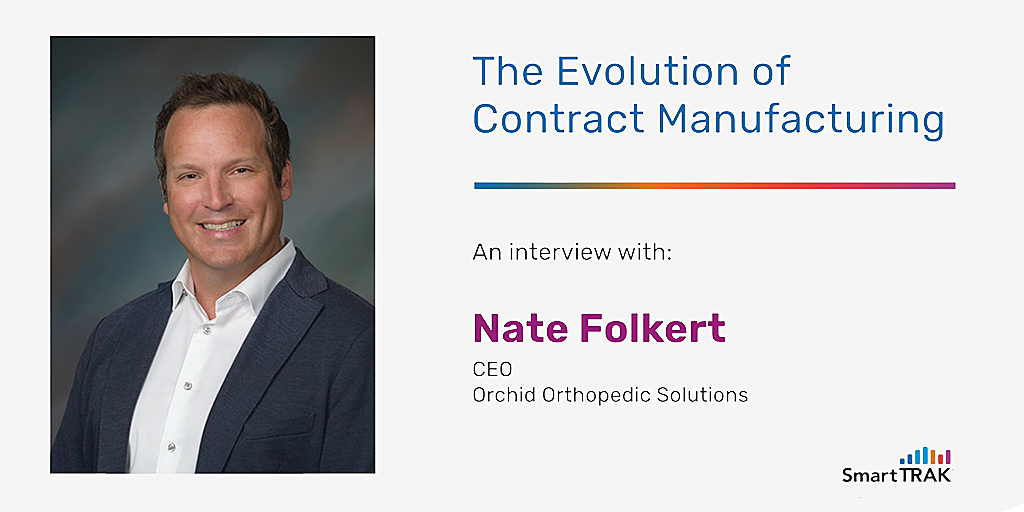 Orchid Orthopedic Solutions CEO Nate Folkert discusses Orchid and the changing landscape of contract manufacturing
Orchid Orthopedic Solutions CEO Nate Folkert discusses Orchid and the changing landscape of contract manufacturing
With locations around the globe, Orchid Orthopedic Solutions has partnered with established medical device companies, start-ups and surgeon entrepreneurs. The Company, which was established in 2005, has evolved to include facilities at 13 locations worldwide offering a range of services from contract design and development through finished goods manufacturing and packaging.
Orchid CEO Nate Folkert discusses his recent transition from the device company side of the Orthopedic business to the supply side, the evolving nature of the supply side business and the changes that have come about as a result of the COVID-19 pandemic. Click on the following video to listen to SmartTRAK’s interview with Folkert recorded live via Zoom (15:09 min). A complete transcript of the interview, with a link to download it, is also provided below.
SmartTRAK: This is Lisa Mahan, SmartTRAK VP of Orthopedics. And today I have the pleasure of speaking with Nate Folkert, the new chief executive officer of Orchid Orthopedic Solutions, a medical device solutions company, providing design and manufacturing services to orthopedic OEMs globally. Prior to joining Orchid, Nate most recently served as Vice President and General Manager for ConMed's orthopedics business, and prior to that as President of Zimmer's Trauma Division and in other leadership roles at Zimmer and Stryker. Nate, thanks so much for joining me today.
Nate Folkert: Good to be here. Thank you.
How has it been for you switching from the OEM side of the business to the supply side?
NF: It's been terrific. Been here about seven weeks now, and I spent the last 20 years or so on the OEM side of the business. And I think that knowledge of the end markets brings a different perspective to Orchid. And so, some of the things the OEMs do really well is customer intimacy, customer service. They're just really high touch in the end markets, but the changing dynamics of healthcare is forcing the OEMs to really look hard at their cost base and ask some tough questions. Do they want to invest more in plants and equipment? Or would you rather spend that money on things that really differentiate them in the market? R&D, marketing, sales. And so, in being a business leader, I think over the past decade or so, at multiple different companies, I understand that the total cost of the product isn't simply the purchase price. And trying to build those connections with the business leaders at our customers is really helping to change those conversations.
You've alluded to how much the industry has changed. Can you explain how the supply side of the business is evolving and where you see it going in the future?
NF: Yeah, it's a good question. So as the contract manufacturers become more sophisticated with management systems like integrated business planning and really tying into their customers, I expect to see more opportunities for the OEMs in-house manufacturing to move actually to contract manufacturers. Also the current supply base in the orthopedic field is very fragmented and it's quite large. So there are many opportunities for full-service contract manufacturers to help the OEMs consolidate their supply base.
What's your definition of a full service?
NF: It's really having truly end-to-end capabilities. So we're able to, for example, provide a complete joint system with one purchase order compared to the current state, which would literally require dozens of different vendors in all the associated complexity with managing through that on the OEM side. So Orchid is pretty unique in the fact that we have the full value stream services all under one roof.
Outside of that, what else do you think makes Orchid unique or different from other design and manufacturing services companies?
NF: I think it's a couple of things. One, I think it's our size. And I think it's, and I go back to, we have capabilities in-house that many other companies don't have. It was something I didn't appreciate fully until I got to Orchid. And then I think back to my times in my last role at ConMed, where you're developing an R&D product and you're having to manage dozens of vendors and the timelines around that. That's difficult. And that adds a ton of complexity into an already complex system.
What parts of the process do you get into with your supply and design? Do you start from engineering on up? Where do you get into the process?
NF: We typically don't do much design work at all. I would say that's a very minimal piece of our business, but what we are great at, is helping the OEMs design for manufacturing. So their expertise is in designing products for the market. Our expertise is helping to make those products in the most efficient way possible. So, once they start having an initial design and an initial idea, that's where we can come in and offer our expertise on the best and most efficient ways to make that product. And then, that's ideally how it would work and with some of our best customers we're involved early in the development process so we can deliver a product on time and under their cost target.
Thinking about your customers, how do you see their strategy changing and how are you responding to that?
NF: I think it would highlight something that I said a little bit earlier is, they are in a price-conscious market and they are in a market where there's been significant consolidation among their customers. So the hospital systems, which has driven consolidation into like the Stryker purchase of Wright Medical and a few years back, the Zimmer purchase of Biomet, they've started to get bigger, to help have some leverage and have some economies of scale. And so, I think as that dynamic continues and their opportunities to get bigger decrease, I think they're going to start looking at where they make their investments in the organization.
And I think the OEMs are going to come to the conclusion, and some of them already are, which is, we'd rather spend our money on things that really set us apart and that we're really good at. And they're really good at R&D. They're really good at marketing, and they're really good at bringing those products to market from a sales standpoint. We're really good at manufacturing. And so, that's where I think we can become a good partnership and they can decrease their investments in their business and spend that money on areas that really differentiate them in the market. Because manufacturing, it doesn't really differentiate an OEM in the market.
A lot of the procedures are shifting to ASCs and outpatient surgery. Do you see that driving any changes within your business?
NF: I don't actually. Short of kitting and helping them design kits for ASC type procedures, so think of like an entire procedure kit in one box so that the ASCs can get everything they need for a particular procedure. Short of that, I don't see it fundamentally changing our overall business, because our business is again, to support their business. I think the shift to ASCs coming from that side is going to drive a tremendous amount of change on the OEM side, but I don't see as much happening on the contract manufacturing side.
When you talk about kitting, do you see disposables being a bigger portion of what you're doing as far as manufacturing the instruments to go along with the implants?
NF: For sure. I think the disposable instruments, but it's actually really kind of a bifurcated market though. The disposable instruments are for obvious reasons in the ASC, are very preferred in the United States. Outside the United States, the disposable instruments are actually pretty frowned upon for a variety of reasons. One is they're more expensive than reusable instruments, and two, there's an environmental impact. So, it's really two different pieces. In the US, I think you'll continue to see greater and greater use of disposables because you're eliminating all the needs for sterilization. And you can also make sure that the product is in spec 100% of the time. But OUS, I think there's going to be even more of a focus around less disposable and more reusable.
Are there any changes that are coming out of the push to get away from ETO sterilization?
NF: We don't do a ton of sterilization, but I would tell you that that has sent a bunch of ripples through the entire market. So the OEMs are struggling to try to figure out alternatives to ETO sterilization, but it has a lot of benefits over gamma sterilization. So that's going to be interesting as it shapes out, but that has sent ripples through the supply chain to put it mildly.
Obviously COVID is top of mind. And with the cases ramping up, especially in the Midwest recently, and there's concern that that's going to affect the market again. Can you share how the pandemic has affected Orchid so far, and then, also how you are detecting and responding to rapid change in your customer's business?
NF: Well, I would say the first thing is we've definitely learned the importance of cross training and redundancy during this process. Because early on, we had some difficulties in our Detroit facility. Thankfully, we've been very successful at keeping our employees safe and healthy. We have had complete revised workflow instruction, social distancing inside our manufacturing facilities, and personal protection implemented almost immediately. So it's allowed us to continue to operate safely. So I would say on the top of it, hats off to our employees for diligently using the PPE and following our revised spacing procedures. I think we were well ahead of this.
The difficulties we had in some of our facilities were contact tracing and that type of thing. So I've been very proud about how the team has done managing this, but I would say as it relates to how it affects our supply chain and our business continuity is, so we're a lot further down the supply chain from the OEMs. So even small change at the procedural level can have big impacts for demand on us. So it's a bit of a bowl up if you think.
So, the OEMs have been using 2020 as a year to right size their inventory position on top of delayed or missed procedures they've experienced. And so, we continue to stay in close communication with them as the market starts to recover, to make sure that we have the right capacity to respond to their growth. And we've seen all the Q3 reports, and we've seen that in our forecast, moving forward into Q4 and Q1, that things are starting to recover. Hopefully this resurgence of COVID doesn't slow that down or stop that again, because I think there's a ton of other health effects that happened with them delaying these procedures. But in sum I'd say is, we've had to be very, very good at communication with customers at multiple different levels. And I think this pandemic has forced us to develop a higher level of customer intimacy.
I know you have manufacturing facilities outside the US. How has the shutdown of borders with several countries, how does that affect the business?
NF: Thankfully, it hasn't short of... We had to shut down a plant for any reason, short of employee health and safety issues. Thankfully it hasn't affected us in terms of shipping. So we have a rather large plant in the UK, and we've still been able to maintain steady supply from that plant during the pandemic.
Do you see any permanent changes coming to Orchid from the pandemic and how you've handled it? Anything positive or things that you've learned that you can implement, keep using in the future?
NF: I would say the prevalence of WebEx, Zoom, Microsoft Teams meeting, I don't think that's going to go away. So, that was something I'd tell you a year ago, I don't think I'd ever been on a Microsoft Teams or Zoom call. And I don't think that's ever going away. But I actually think that's a good thing. We've learned during this period that you can accomplish a lot in a salary position, working from home versus working in the office. So, I think that will never go away. And I don't see that going away for the OEMs either.
There's some things you can't do remotely, which is all of our manufacturing. We need our workers there. And so, on that level, I think we have to return to the office at some point, but I think a more flexible work environment is here to stay I would say for salary positions. I don't see that changing. I think business continuity planning has improved. So we have a lot of new tools around staffing, demand planning and supply planning. And this has forced us to get better at that. So we already had a lot of activities underway and we've just had to accelerate it.
So I know sometimes with manufacturing of medical implants, it's a totally different animal than other manufacturing. How do you keep up with finding talent for your business?
NF: That's something that we are laser focused on at Orchid is making sure we've got the best talent in every single role. And I think we have a great benefit package. We have a great salary package, and we've got a great recruiting team that helps us to fill all of our critical roles.
Do you get involved with education at all? Trying to drive that supply of future employees?
NF: At our size right now, that's not something we really get involved with too much. So I know we have some partnerships in the Lansing area for that, but that is a... I would tell you that the change in thought process around manufacturing work, you can make a good living in manufacturing. And I think as a country, we could do a much better job educating people around that.
What are the next big opportunity areas for Orchid to drive change? Where do you see that going?
NF: I think it's really around continuing to simplify the supply chain. I think our biggest opportunity is to treat our OEMs like they treat their customers, which is high touch, high customer service, high responsiveness, making and keeping commitments, doing what we say we're going to do. I think that earns you a lot of business. I think doing that can show them how we can simplify their supply chain and free up cash for them to do and invest in other areas of their business.
Do you see any trends in manufacturing technologies that are starting to emerge that look interesting to you?
NF: Yeah. So there's a number of new coating technologies out there that are particularly interesting to us that we see a lot of. I think some of the differentiated products that will be coming out is really around how do you do additive manufacturing? What new types of coatings can you put on the materials? And then, the materials in general, there's a couple of new technologies around material selection that have got us pretty excited. So there's still some research to do there. And so, we spend our time in effort and energy in our research around new manufacturing techniques, new coating, and development of new materials.
Does anything that's going on with the trend towards robotics in orthopedics affect how Orchid does its business, or is that really kind of separated?
NF: Yes and no. So, yes, in the sense that there's a lot that goes into a robotic procedure that we can add value to our customers. And in a number of cases we're working on that right now. So, in some respects, it's another product that we can help our customers deliver to the market. But on the other hand, similar to the ASC business, we're fairly agnostic, how and where they do the procedure. If you use a robot, you're still putting in a total knee and we make a lot of total knees, and everything that goes around it.
I know you've been with Orchid just a few months, but looking to the future, putting on your fortune-tellers hat, where do you see the company in five years? What would you like that to look like?
NF: I'd say growing with our customers. Our job is to make our customers successful so we can do more steps in the value stream. I think we can lead the industry in delivering quality and customer service. And I think creating an environment where our team members can perform at a high level and build a rewarding career. And financially speaking, we'd like to be the number one contract manufacturer in the market with revenues approaching a billion dollars. And that scale is how we can add tremendous value to our customers.
Is there anything else that you'd like to add from your standpoint of just being new at Orchid and your experience so far?
NF: Yeah. I would tell you that the last six, seven, eight weeks have flown by and I have just been incredibly impressed with the level of talent we have at Orchid, the desire to get better for our customers. I'm extraordinarily excited about our people. I'm extraordinarily excited about the market we're in, and I'm extraordinarily excited about the prospects for Orchid moving forward.
If you would like to download the complete transcript of the interview with Nate Folkert, please click the button below.
SmartTRAK is a comprehensive, easy-to-use, business intelligence solution that networks an entire organization with real-time market data and analysis. Used by the 8 of the top 10 orthopedic companies and by 15 of the top 15 advanced wound care companies, SmartTRAK transforms the delivery of healthcare business information into a cost-effective solution for life science corporations to increase proficiency, improve productivity and reduce cost.








